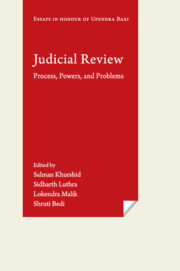Book contents
- Frontmatter
- Contents
- Foreword
- Editors' Note
- Introduction
- 1 The Inadequacy of Judicial Enforcement of Constitutional Rights Provisions to Rectify Economic Inequality, and the Inevitability of the Attempt
- 2 The Interplay of Law and Politics in India
- 3 Beating the Backlog: Reforms in Administration of Justice in India
- 4 Judicial Review: Perspectives and Reflections for the Twenty-First Century
- 5 When ‘Creeping Jurisdiction’ Goes Awry: The Social Action Litigation to Ban Surrogacy
- 6 Judicial Review and the Democratic Judge
- 7 Judicial Review: A Tool to Shape Constitutional Jurisprudence
- 8 The Baxian Bioscope on Indian Judicial Process
- 9 Judicial Activism, Courts, and Constitutional Revolutions: The Israeli Case
- 10 Democracy, Constitution, and Judicial Review: A Critique
- 11 A Minor Jurisprudence of Pathos: Upendra Baxi as Teacher and Writer
- 12 The Need for Reinventing the Supreme Court as a Constitutional Court
- 13 Appointment of ‘Distinguished Jurists’ as Judges in the Supreme Court of India: A Critical Analysis
- 14 Judicial Dissent and Judicial Review: A Functional Analysis
- 15 The Power of Judicial Review: Judicial Chutzpah or Judicial Desideratum
- 16 Judicial Review of Legislations by Tribunals in India: Law, Problems, and Perspectives
- 17 Criminalization of Membership of Terrorist Organizations in India and the United States of America: Human Rights Concerns
- 18 Article 142 of the Indian Constitution: On the Thin Line between Judicial Activism and Restraint
- 19 Sketching the Limits of Article 142 of the Constitution of India: A Constitutional Necessity
- 20 Constitutional Morality and Judges of the Supreme Court
- About the Contributors
- Index
3 - Beating the Backlog: Reforms in Administration of Justice in India
Published online by Cambridge University Press: 23 January 2020
- Frontmatter
- Contents
- Foreword
- Editors' Note
- Introduction
- 1 The Inadequacy of Judicial Enforcement of Constitutional Rights Provisions to Rectify Economic Inequality, and the Inevitability of the Attempt
- 2 The Interplay of Law and Politics in India
- 3 Beating the Backlog: Reforms in Administration of Justice in India
- 4 Judicial Review: Perspectives and Reflections for the Twenty-First Century
- 5 When ‘Creeping Jurisdiction’ Goes Awry: The Social Action Litigation to Ban Surrogacy
- 6 Judicial Review and the Democratic Judge
- 7 Judicial Review: A Tool to Shape Constitutional Jurisprudence
- 8 The Baxian Bioscope on Indian Judicial Process
- 9 Judicial Activism, Courts, and Constitutional Revolutions: The Israeli Case
- 10 Democracy, Constitution, and Judicial Review: A Critique
- 11 A Minor Jurisprudence of Pathos: Upendra Baxi as Teacher and Writer
- 12 The Need for Reinventing the Supreme Court as a Constitutional Court
- 13 Appointment of ‘Distinguished Jurists’ as Judges in the Supreme Court of India: A Critical Analysis
- 14 Judicial Dissent and Judicial Review: A Functional Analysis
- 15 The Power of Judicial Review: Judicial Chutzpah or Judicial Desideratum
- 16 Judicial Review of Legislations by Tribunals in India: Law, Problems, and Perspectives
- 17 Criminalization of Membership of Terrorist Organizations in India and the United States of America: Human Rights Concerns
- 18 Article 142 of the Indian Constitution: On the Thin Line between Judicial Activism and Restraint
- 19 Sketching the Limits of Article 142 of the Constitution of India: A Constitutional Necessity
- 20 Constitutional Morality and Judges of the Supreme Court
- About the Contributors
- Index
Summary
Introduction
As the highest law of a country, the constitution is at the centre of the political and social life of the country and defines the relationship between state and society. The task of the judiciary in the Indian democratic set-up is to interpret the constitution as a living, pulsating, and evolutionary organic document and not merely state what the textual law is in a sterile or pedantic manner. The judicial system, however, needs another, equally important, ecosystem to operate—it cannot work in a vacuum. This system is the administration of justice—its structure, its tools, logistics, manpower, procedures, technology, and so on—which is the spine and backbone of the constitutional court system itself, and hence an indispensable part of the larger judicial and social process.
Looking at the system of administration of justice in India—jammed, overcrowded, inefficient, and delayed—one could easily agree with Benjamin Franklin as to ‘how for want of just a horseshoe nail, a battle could not be fought and a kingdom was lost’. It is tragic that for the last seventy years, a plan for the entire judiciary as a holistic and integrated entity has not been formulated with a minimum perspective of five years, subsuming shorter plans for shorter periods, and implemented ceaselessly and relentlessly. Successive chief justices of India—as captains of the judiciary—have attempted to make ‘speedy justice’ a reality, but it continues to remain in the realm of imagination, hope, anticipation, rhetoric (and despair)! Commenting on the huge vacancies of judicial officers, the current chief justice of India, Justice Ranjan Gogoi, said that the agonizingly slow recruitment process can be speeded up if ‘you have the right persons at right places’. He probably wondered if Puducherry had the right man to complete the recruitment of trial judges in 99 days, when Delhi took 762 days and Jammu and Kashmir took 700 days.
Slow and tardy appointment of judges is not the only factor that has acted as a barrier and retarded the system of justice delivery. There is a barrage of simple and complex issues inhibiting the rate of disposal of cases and leading to frictional functioning of courts in India.
- Type
- Chapter
- Information
- Judicial Review , pp. 46 - 59Publisher: Cambridge University PressPrint publication year: 2020



